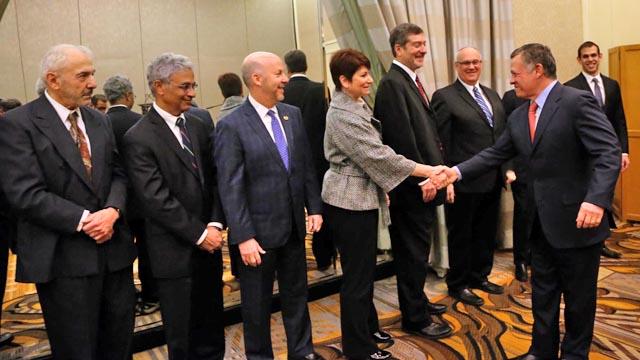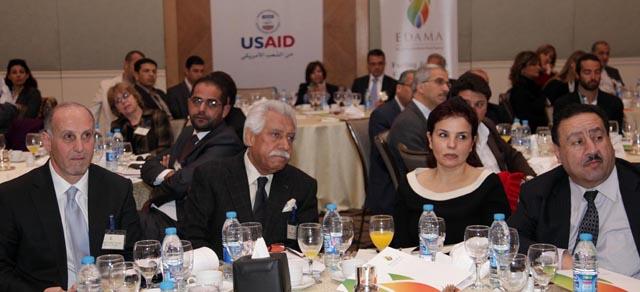AMMAN — His Majesty King Abdullah on Thursday met with representatives of several leading American Jewish organisations and discussed ways to support the US-brokered peace efforts.
At a meeting in Washington, King Abdullah noted that the decades-old Palestinian-Israeli struggle constitutes the core conflict in the Middle East, adding that arriving at a just and a comprehensive solution is the responsibility of all, including Jewish organisations in the US.
The King urged the Jewish leaders to support peace efforts for the best of the region, its people and future generations.
Establishing an independent Palestinian state on national Palestinian soil, within the pre-1967 lines and with East Jerusalem as its capital is a regional and international interest, so everybody should shoulder this responsibility and carry out whatever is needed to achieve this goal, the King told his audience.
The King stressed the important role that the Jewish organisations and leading figures in the US can play, stressing the need for them to back the US administration in its efforts to push the peace process forward.
Final status issues between the Palestinians and the Israelis are at the core of Jordan’s interests, the King said, noting that safeguarding the Kingdom’s national interests comes at the top of the country’s priorities when discussing these issues.
King Abdullah highlighted the 2002 Arab Peace Initiative, which, he said, provides a historic opportunity to end the Arab-Israeli struggle, as it guarantees the establishment of an independent Palestinian state and provides security for Israel and a chance to make peace with 57 Arab and Muslim states.
Unless peace is achieved in the Middle East, there will be more tension and instability, and the entire region and its people will be pushed into the abyss, the King added.
King Abdullah warned against Israel’s settlement policies in Jerusalem and attempts to infringe on Islamic and Christian sites and to Judaise the eastern part of the city.
At the meeting, the Monarch shed light on several regional issues, especially developments of the crisis in Syria and Jordan’s relief aid for Syrian refugees.
Leading American Jewish figures lauded the King’s continued efforts to achieve peace and his vision to build a better future for the region’s people. They valued the King’s “wisdom and moderation”, commending the way he puts issues forward and the way he approaches challenges in the Middle East.
In an interview with the Jordan News Agency, Petra, President and CEO of the Jewish Council for Public Affairs Steve Gutow said they are viewing the peace process with optimism and His Majesty pushes everybody to be optimistic about achieving progress in the peace process.
His Majesty is a leader of a special kind, he added.
Gutow stressed the two parties, Palestinians and Israelis, should be aware of the importance of mutual confidence and adopting ways that make the Palestinians feel they will have a state and which make Israel see it will live in security, he said, noting that all this can be done through the peace process and believing in it.
Treasury and IMF
Also on Thursday, King Abdullah met separately with
Christine Lagarde, managing director of the International Monetary Fund (IMF), and US Treasury Secretary Joseph Lew.
At his meeting with the US Treasury secretary, the King discussed cooperation between Jordan and the US in various areas, mainly regarding financial and economic cooperation.
King Abdullah expressed Jordan’s appreciation of the US government’s support for Jordan, especially for its recent issuance of $1.25 billion in US-guaranteed eurobonds.
The US official asserted his country’s continued economic assistance to Jordan to help it address the repercussions of the Syrian conflict.
At his meeting with Lagarde, discussions focused on the country’s relations with the IMF and the technical assistance that it provides to guarantee the implementation of the Kingdom’s economic correctional programme, which started around two years ago.
The meeting also covered financial and monetary developments in Jordan, mainly under the programme, which will continue in 2015.
The King stressed that the programme implemented by the Kingdom and the IMF should take the issue of protecting the poor and the middle class brackets into its consideration and ensure that they are not affected adversely.
King Abdullah and Lagarde also discussed the high-level conference on “Building the Future: Jobs, Growth, and Fairness in the Arab World”, which the government, in cooperation with the Arab Fund for Economic and Social Development and the IMF, will host in Amman on May 11-12.
In a statement that was issued by the fund following the meeting, the IMF said the meeting was an opportunity to discuss recent global, regional and domestic economic developments, including the toll taken by the Syrian conflict, and its impact on the Jordanian economy.
The IMF managing director noted the good progress made by the authorities in moving forward on the economic reform programme under the Stand-By Arrangement with the IMF, and reiterated the IMF’s commitment to continue supporting Jordan’s efforts to put in place home-grown policies that promote macroeconomic stability, inclusive growth and higher employment.
At the Senate
On Wednesday, His Majesty met with leaders of the US Senate and discussed developments in Middle East peace talks and the Syrian crisis, in addition to ways to enhance bilateral ties.
The King, accompanied by HRH Crown Prince Hussein, met separately with Senator Robert Menendez (D-New Jersey), chairman of the Senate Committee on Foreign Relations, and other panel members; and with Senator Barbara Mikulski (D-Maryland), chairperson of the Senate Committee on Appropriations, and other members.
King Abdullah also met with US Senate majority and minority leaders, Harry Reid (D-Nevada) and Mitch McConell (R-Kentucky) respectively.
Discussions covered ways to lobby for US economic support to the Kingdom to enable it to face the impact of regional challenges on its economy, especially the Syrian refugee crisis.
His Majesty voiced appreciation for the assistance provided by the US to support Jordan’s economic reform and comprehensive development programmes, the Royal Court said.
On regional issues, he stressed the need to resolve the Palestinian issue, which lies at the heart of the Middle East conflict, calling for an independent Palestinian state within the June 4, 1967 borders and with East Jerusalem as its capital.
The Monarch also called for finding a solution that would end the bloodshed and suffering in Syria, highlighting the burdens carried by Jordan in hosting the largest number of Syrian refugees.
He also reviewed the Kingdom’s reform steps, which have been taken gradually and within a balanced approach that meets the aspirations of all Jordanians.
The leaders of the US Senate called for increasing international and US support for Jordan in facing the Syrian refugee crisis with its limited resources, expressing their country’s commitment to maintaining coordination with the King and heeding his counsel on ways to address Middle East developments.
In an interview with Petra after the meetings, Menendez said the discussions were fruitful, adding that the Senate will increase the financial assistance allocated to Jordan to enable it to address economic challenges.
Jordan is a strong strategic ally to the US, the senator added, noting that Washington will continue cooperating with the Kingdom.
His Majesty was due to meet with President Barack Obama in California late Friday.














